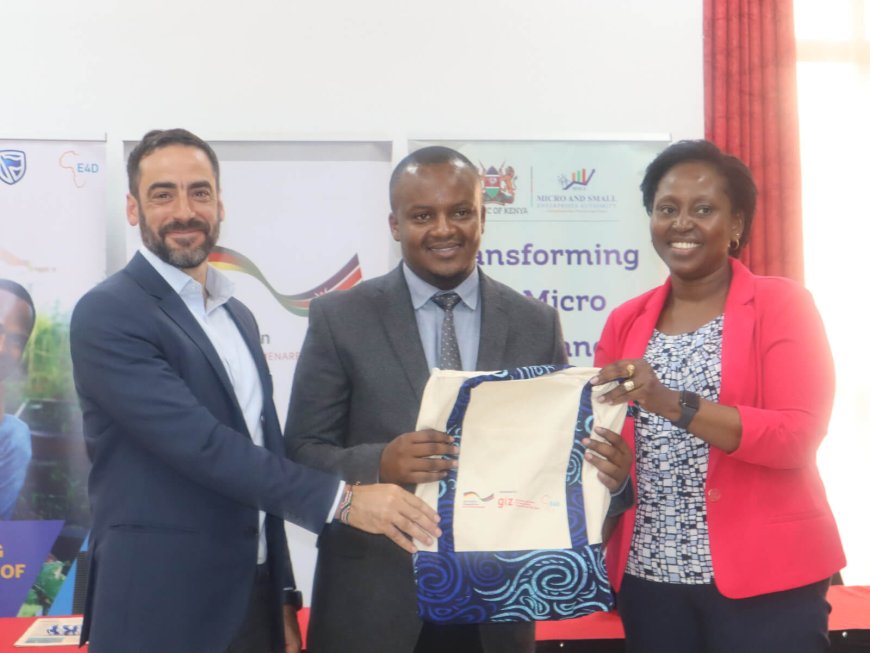County Government of Nakuru Supporting MSMEs to spur growth, create jobs

Nakuru, Friday, April 28, 2023
K.N.A By Anne Mwale
Nakuru County Government is promoting policies that support access to financing instruments for Micro and Small, Medium Enterprises (MSMEs) as well as creating risk sharing and risk mitigation strategies for high-risk MSMEs seeking financing.
The devolved unit’s administration has also urged MSMEs to leverage alternative financial facilities set aside by the national government to benefit, especially disadvantaged groups such as women, the youth and people living with disabilities.
County Cooperatives and Enterprise Chief Officer, Martin Kagai said such facilities include the Youth Enterprise Development Fund (YEDF), which provides affordable credit to youth-led businesses in order to mainstream their participation in economic growth. Others, he added, are the Uwezo Fund set aside for women, youth and people living with disabilities to promote businesses and enterprises at the grassroots level.
Mr Kagai stated that Governor Susan Kihika’s administration was committed to supporting MSMEs in order to spur growth and create jobs.
“Micro and Small, Medium Enterprises (MSMEs) account for the bulk of businesses in Kenya, hence they are the single-most-important vehicle for job creation and economic development. In Kenya, MSMEs are vital actors in enhancing innovation, competitiveness and entrepreneurship,” observed the Chief Officer.
While noting that most MSMEs had been adversely affected by Covid-19 economic aftershocks, Mr Kagai stated that affordable financing remained a challenge due to high interests offered.
He added “We urge financial institutions to realign their programs by assisting traders adapt to the new reality caused by COVID-19 pandemic,”
Speaking during the graduation of 200 entrepreneurs who have undergone one-week capacity building training, through a program dubbed ‘’the MSME resilience program’’ the Chief Officer disclosed that the County Government would continue providing opportunities for MSMEs sector to grow particularly through the provision of a conducive environment for ease of doing business.
Participants were trained on business resilience, digital sales and marketing, financial management, customer care, access to markets and new value chains as well as legal and compliance requirements.
The initiative was implemented by the County Government in partnership with Deutsche Gesellschaft für Internationale Zusammenarbeit (GIZ).
Mr Kagai explained that the critical contribution of MSMEs to broader socio-economic objectives, including job creation, makes them a key priority area for achieving Sustainable Development Goals (SDGs).
The Chief Officer said “For MSMEs to keep creating jobs, increase incomes and contribute to sustainable food systems there is a need for access to markets, financing, and continuous skills development,”
He went on “Through public-private partnerships the County government is ensuring that MSME’s get support through affordable, flexible, and patient credit with a focus on upgrading MSMEs to make them sustainable through investment in working capital, technological innovations, and capacity development for increased food safety and productivity, driven by market systems demands,”
Mr Kagai observed that access to finance for MSMEs will help boost investments whilst building strong market linkages that strengthen trade and investments.
“The MSME sector drives the economy of this country. Our future lies in the promotion of small businesses. Some of these large organizations were started in homes and garages and, because they got the support they needed, they were able to grow,” noted Mr Kagai.
Though MSMEs were critical to the economy as a source of employment, Mr Kagai said some of the hurdles they faced include the cost of borrowing. Many MSMEs he added do not have bank accounts and, therefore, cannot access financial services.
“The sector creates employment for over 15 million people and has a value output of Sh3.3 trillion. This makes it a high-priority segment in the realization of any government’s economic transformation agenda,” he said.
Mr Kagai observed that poor financial literacy means many MSMEs are locked out of the formal credit market as they do not operate in a manner that would enable lenders to ascertain their credit scores and, ultimately, their creditworthiness.
The other major challenge according to the Chief Officer is that they operate informally and their activities are not even well understood.
A 2016 survey by the Kenya National Bureau of Statistics showed that of the 7.4 million MSMEs, only 1.56 million, 21 percent of them, were licensed by the counties.
Informality means the majority of them, though contributing to jobs and economic growth, are not documented and cannot benefit from programmes targeted at improving them.
Mr Kagai affirmed that enhancing the contribution of MSMEs to the economy was a key priority of the county government adding that they were working on a package of interventions that include an enabling business environment, access to finance and markets.
“We are creating a conducive business environment for MSMEs that includes a framework of policies that encourage them to grow, to reduce their mortality rate. Their survival depends on whether they are supported through enabling regulations and affordable fees and taxes,” the Chief Officer pointed out.
He said greater access to finance would improve the survival of MSMEs and help them to move up their value chains. The financial sector does not offer a solution to the capital needs of MSMEs.
“MSMEs contribute over 40 per cent of our gross county product (GCP) and 90 per cent of employment. A major economic driver, it should be protected and supported. In response, the county government has partnered with various financial institutions in a structured Credit Guarantee Scheme,” Mr Kagai disclosed
Courtesy K.N.A
What's Your Reaction?



































































































































































































































































































